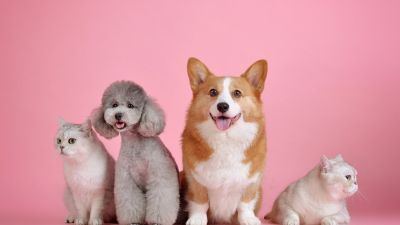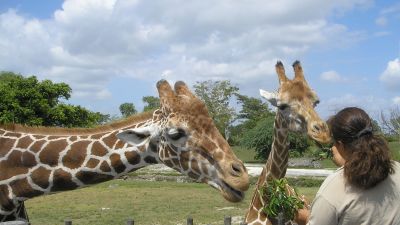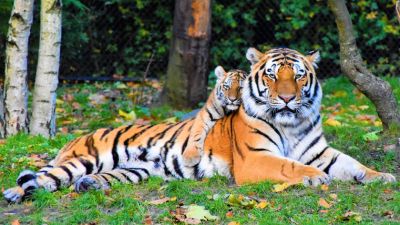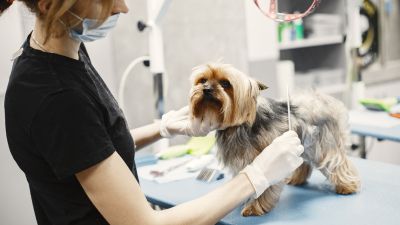Pets and Animals in Japanese – Learn the Vocabulary and Culture
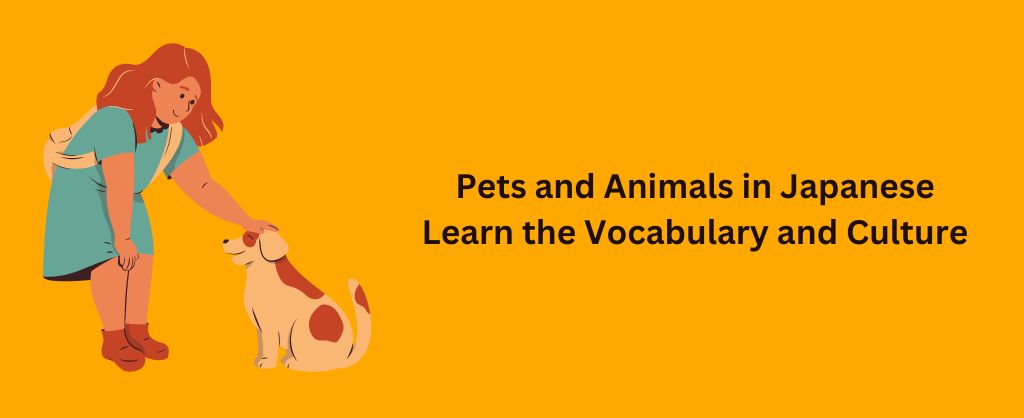
Register For the Online Japanese Event
Japan has a long and rich history of keeping pets and interacting with animals. While some animals like dogs and cats are common pets around the world, others like the Japanese raccoon dog (tanuki) are more uniquely Japanese.
Learning the Japanese words for common pets and animals is a great way to expand your vocabulary.
Covered Topics
- Common Household Pets
- Farm, Zoo, and Wild Animals
- Pet Care Vocabulary
- Uninvited Household Pests
- Japanese Pet Culture & Etiquette
- Important Phrases for the Conversation
Common Household Pets
Dogs – 犬 (Inu)
Dogs are popular pets worldwide, and Japan is no exception. Some of the most popular dog breeds in Japan include Shiba Inu, Akita, Toy Poodle, Chihuahua, and mixed breeds.
Here are some useful Japanese dog terms:
- Dog – 犬 (Inu)
- Puppy – 仔犬 (Koinu)
- Breed – 犬種 (Kenshu)
- Leash – リード (Rīdo)
- Collar – 首輪 (Kubiwa)
- Dog house – 犬小屋 (Inugoya)
- Dog food – 犬用食品 (Inuyō shokuhin)
Example sentences:
- 私は子供の頃、犬を飼っていました。(Watashi wa kodomo no koro, inu o katte imashita. – I had a dog when I was a child.)
- この仔犬はとてもかわいいですね。(Kono koinu wa totemo kawaii desu ne. – This puppy is so cute.)
Cats – 猫 (Neko)
Cats are equally beloved in Japan. Some popular Japanese cat breeds include Japanese Bobtail, Kurilian Bobtail, Japanese Chin, and mixed breeds.
Useful Japanese cat terms include:
- Cat – 猫 (Neko)
- Kitten – 仔猫 (Koneko)
- Litter box – トイレ (Toire)
- Scratching post – 猫じゃらし (Nekojarashi)
- Cat toy – 猫遊具 (Nekoyūgu)
- Cat food – 猫用食品 (Nekoyō shokuhin)
Example sentences:
- うちの猫は毎日遊ぶのが大好きです。(Uchi no neko wa mainichi asobu no ga daisuki desu. – My cat loves to play every day.)
- この仔猫は生後2ヶ月です。(Kono koneko wa seigo 2-kagetsu desu. – This kitten is 2 months old.)
Birds – 鳥 (Tori)
Birds like parakeets and canaries are popular cage pets in Japan. Here are some useful terms:
- Bird – 鳥 (Tori)
- Chick – 雛 (Hina)
- Cage – 鳥かご (Torikago)
- Bird feed – 鳥用餌 (Toriyō esa)
- Bird toy – 鳥遊具 (Toriyūgu)
Example sentences:
- カナリアは美しい鳥ですね。(Kanaria wa utsukushii tori desu ne. – Canaries are beautiful birds.)
- この雛は生後1週間です。(Kono hina wa seigo isshūkan desu. – This chick is 1 week old.)
Fish – 魚 (Sakana)
Fish like goldfish, betta fish, and koi are commonly kept in tanks and ponds in Japan. Useful Japanese words include:
- Fish – 魚 (Sakana)
- Goldfish – 金魚 (Kingyo)
- Betta fish – ベタ (Beta)
- Koi – 鯉 (Koi)
- Aquarium – 水槽 (Suiso)
- Fish food – 魚のエサ (Sakana no esa)
Example sentences:
- この水槽には多くのトロピカルフィッシュがいます。(Kono suiso ni wa ōku no toropikarufisshu ga imasu. – This aquarium has many tropical fish.)
- わが家の庭には色とりどりの鯉がいます。(Wa ga ie no niwa ni wa irodorino koi ga imasu. – There are colorful koi in my house’s garden.)
Farm Animals
While less common as pets, many Japanese people encounter farm animals and wildlife through agriculture, zoos, and the countryside.
Cows – 牛 (Ushi)
- Cow – 牛 (Ushi)
- Bull – 牛 (Oushi)
- Calf – 子牛 (Koushi)
- Milk – 牛乳 (Gyūnyū)
Example sentences:
- この牧場にはたくさんの牛がいます。 (Kono bokujō ni wa takusan no ushi ga imasu. – There are many cows on this ranch.)
- 新鮮な牛乳を飲みたいです。(Shinsen’na gyūnyū o nomitai desu. – I want to drink fresh milk.)
Pigs – 豚 (Buta)
- Pig – 豚 (Buta)
- Boar – 雄豚 (Obuta)
- Sow – 雌豚 (Mebuta)
- Piglet – 子豚 (Kobuta)
Example sentences:
- あの農場では豚を飼育している。(Ano nōjō de wa buta o shiiku shite iru. – That farm raises pigs.)
- 可愛い子豚達がいますね。(Kawaii kobuta-tachi ga imasu ne. – The piglets are so cute.)
Horses – 馬 (Uma)
- Horse – 馬 (Uma)
- Stallion – 雄馬 (Oba)
- Mare – 雌馬 (Meba)
- Foal – 仔馬 (Kouma)
- Saddle – 鞍 (Kura)
Example sentences:
- 友達は馬術競技が得意です。(Tomodachi wa bajutsu kyōgi ga tokui desu. – My friend is good at equestrian events.)
- その牧場には10頭の馬がいます。 (Sono bokujō ni wa jū-tō no uma ga imasu. – There are 10 horses on that ranch.)
Sheep – 羊 (Hitsuji)
- Sheep – 羊 (Hitsuji)
- Ram – 雄羊 (Oyō)
- Ewe – 雌羊 (Meyō)
- Lamb – 子羊 (Kohitsuji)
- Wool – 羊毛 (Yōmō)
Example sentences:
- その農家では羊の毛刈りをしていました。(Sono nōka de wa hitsuji no kezuri o shite imashita. – That farm was shearing sheep.)
- 可愛い子羊が母羊のそばで遊んでいます。(Kawaii kohitsuji ga haha-hitsuji no soba de asonde imasu. – The cute lamb is playing near its mother.)
Deer – 鹿 (Shika)
- Deer – 鹿 (Shika)
- Stag – 雄鹿 (Ojika)
- Doe – 雌鹿 (Mesika)
- Fawn – 子鹿 (Kojika)
Example sentences:
- 田舎にはよく鹿が森を走り回っているのを見かけます。(Inaka ni wa yoku shika ga mori o hashirimawatte iru no o mikakemasu. – In the countryside, you often see deer running around the forest.)
- 可愛く小さな子鹿が歩いて来ました。 (Kawaiku chīsana kojika ga aruite kimashita. – A cute little fawn came walking over.)
Zoo Animals
Visiting the zoo is a favorite activity in Japan, and zoos display animals from around Japan and the world.
Here are some common zoo animals in Japanese:
Monkey – 猿 (Saru)
- Monkey – 猿 (Saru)
- Baboon – バブーン (Babūn)
- Chimpanzee – チンパンジー (Chinpanjī)
- Gorilla – ゴリラ (Gorira)
- Orangutan – オランウータン (Oran’ūtan)
Example sentences:
- あのサルは木の上を飛び回っています。(Ano saru wa ki no ue o tobi-mawatte imasu. – That monkey is jumping around in the trees.)
- ゴリラは迫力があるな。(Gorira wa hakuryoku ga aru na. – Gorillas are so imposing.)
Bears – 熊 (Kuma)
- Bear – 熊 (Kuma)
- Grizzly bear – グリズリー (Gurizurī)
- Panda – パンダ (Panda)
- Polar bear – 北極熊 (Hokkyokuguma)
- Koala – コアラ (Koara)
Example sentences:
- クマは蜂蜜が大好きなのは有名です。(Kuma wa hachimitsu ga daisuki na no wa yūmei desu. – Bears are famously fond of honey.)
- パンダはキュートな熊ですね。 (Panda wa kyūto na kuma desu ne. – Pandas are such cute bears.)
Big Cats – ネコ科 (Nekokaden)
- Lion – ライオン (Raion)
- Tiger – タイガー (Taigā)
- Leopard – ヒョウ (Hyō)
- Cheetah – チーター (Chītā)
- Jaguar – ジャガー (Jagā)
Example sentences:
- トラの縞模様は美しい。(Tora no shima-moyō wa utsukushii. – A tiger’s stripes are beautiful.)
- ライオンの鳴き声はすごかった。(Raion no nakigoe wa sugokatta. – The lion’s roar was incredible.)
Giraffes – キリン (Kirin)
- Giraffe – キリン (Kirin)
- Calf – 子キリン (Kokirin)
Example sentences:
- キリンの首がとても長かった。(Kirin no kubi ga totemo nagakatta. – The giraffe had a very long neck.)
- 子キリンが母キリンの側で遊んでいた。(Kokirin ga haha-kirin no soba de asonde ita. – The giraffe calf was playing near its mother.)
Elephants – ゾウ (Zō)
- Elephant – ゾウ (Zō)
- Calf – 子ゾウ (Kozō)
- Tusks – 牙 (Gê)
Example sentences:
- ゾウは鼻が長くて迫力がある。(Zō wa hana ga nagakute hakuryoku ga aru. – Elephants have long noses and are imposing.)
- 子ゾウが母ゾウのしっぽをつかんでいた。 (Kozō ga haha-zō no shippo o tsukande ita. – The elephant calf was holding its mother’s tail.)
Reptiles – 爬虫類 (Hachūrui)
- Snake – ヘビ (Hebi)
- Lizard – トカゲ (Tokage)
- Turtle – カメ (Kame)
- Crocodile – ワニ (Wani)
Example sentences:
- ヘビは体がなめらかでうねうね動く。(Hebi wa karada ga nameraka de uneune ugoku. – Snakes have smooth, winding bodies.)
- カメの甲羅は丈夫だ。(Kame no kōra wa jōbu da. – A turtle’s shell is sturdy.)
Birds – 鳥 (Tori)
- Eagle – ワシ (Washi)
- Owl – フクロウ (Fukurō)
- Peacock – クジャク (Kujyaku)
- Penguin – ペンギン (Pengin)
- Flamingo – フラミンゴ (Furamingo)
Example sentences:
- ワシは 날개가 껄고 하늘을 날다. (Washi wa tsubasa ga takaku sora o tobu. – Eagles have large wings and fly high in the sky.)
- フクロウは 夜 사냥을 한다. (Fukurō wa yoru kari o suru. – Owls hunt at night.)
Wild Animals
While not as common in daily life, Japan’s wild animals also have unique Japanese names.
Here are a few examples:
Fox – 狐 (Kitsune)
- Fox – 狐 (Kitsune)
- Red fox – レッドフォックス (Reddofokkusu)
Example sentences:
- 狐は神秘的な動物だと思う。(Kitsune wa shinpiteki na dōbutsu da to omou. – I think foxes are mystical creatures.)
- レッドフォックスはキュートだ。(Reddofokkusu wa kyūto da. – Red foxes are cute.)
Tanuki – 狸 (Tanuki)
- Japanese raccoon dog – 狸 (Tanuki) – 狸は日本特有の動物だ。(Tanuki wa nihon tokuyū no dōbutsu da. – The tanuki is an animal unique to Japan.)
Japanese Macaque – 猿 (Nihonzaru)
- Japanese macaque – 日本猿 (Nihonzaru) – 日本猿は温泉で寒さをしのぐ。(Nihonzaru wa onsen de samusa o shinogu. – Japanese macaques warm up in hot springs.)
Deer – 鹿 (Shika)
- Sika deer – シカ (Shika) – 四国にはシカが多い。(Shikoku ni wa shika ga ōi. – There are many sika deer in Shikoku.)
Pet Care Vocabulary
Caring for pets also requires learning specialized vocabulary in Japanese.
Here are some useful terms:
- To feed – 餌をやる (Esa o yaru)
- To groom – 手入れする (Te’ire suru)
- To train – 訓練する (Kunren suru)
- To walk a dog – 散歩に連れて行く (Sanpo ni tsureteiku)
- Litter box – トイレ (Toire)
- To clean the litter box – 猫トイレの掃除をする (Neko toire no sōji o suru)
- To bathe – お風呂に入れる (Ofuro ni ireru)
- Pet food – ペットフード (Pettofūdo)
- Treats – おやつ (Oyatsu)
- Toys – おもちゃ (Omocha)
- Vet – 獣医 (Jūi)
- Vaccinations – 予防接種 (Yobō sesshu)
Example sentences:
- 毎朝、犬の散歩に連れて行きます。(Maiasa, inu no sanpo ni tsurete ikimasu. – I take my dog for a walk every morning.)
- 猫はトイレの掃除が嫌いだ。(Neko wa toire no sōji ga kiraida. – Cats dislike cleaning the litter box.)
- 獣医にペットを定期的に診てもらうことが大切だ。(Jūi ni petto o teiki-teki ni mite morau koto ga taisetsu da. – It’s important to have the vet examine your pet regularly.)
Uninvited Household Pests
Even the cleanest homes in Japan sometimes have uninvited guests like pests. Here are some common terms:
昆虫 – Konchuu – Insects
Cockroaches – ゴキブリ (Gokiburi)
- Cockroach – ゴキブリ (Gokiburi)
- To exterminate – 駆除する (Kucho suru)
- Roach motel – ゴキブリ取り (Gokiburi tori)
Example sentences:
- キッチンにゴキブリが出るのが嫌いだ。(Kicchin ni gokiburi ga deru no ga kiraida. – I don’t like when cockroaches come out in the kitchen.)
- ゴキブリ取りを使って駆除します。(Gokiburi tori o tsukatte kucho shimasu. – I use roach motels to exterminate them.)
Spiders – クモ (Kumo)
- Spider – クモ (Kumo)
- Cobweb – クモの巣 (Kumo no su)
- To get rid of cobwebs – クモの巣を払う (Kumo no su o harau)
Example sentences:
- クモは網を作るのが上手だ。 (Kumo wa ami o tsukuru no ga jōzu da. – Spiders are good at making webs.)
- クモの巣を時々掃除機で払います。(Kumo no su o tokidoki sōjiki de haraimasu. – I get rid of cobwebs with the vacuum cleaner from time to time.)
Ants – アリ (Ari)
- Ant – アリ (Ari)
- Anthill – アリの巣 (Ari no su)
- Ant trap – アリ取り (Ari tori)
Example sentences:
- アリは働き者で組織的だ。(Ari wa hatarakimono de soshiki-teki da. – Ants are hard workers and organized.)
- アリの巣が庭にできている。(Ari no su ga niwa ni dekite iru. – There’s an anthill forming in the yard.)
Mice & Rats – ネズミ (Nezumi)
- Mouse – マウス (Mausu)
- Rat – ラット (Ratto)
- Mouse trap – ネズミ取り (Nezumi tori)
- Rat poison – 鼠取り(Nezumi tori)
Example sentences:
- ネズミは夜に動くので気づきにくい。(Nezumi wa yoru ni ugoku no de kizukanikui. – Mice move at night so they’re hard to notice.)
- ネズミ取りを仕掛けて駆除する。(Nezumi tori o shikake kucho suru. – I set mouse traps to get rid of them.)
Japanese Pet Culture & Etiquette
Pet ownership comes with its own set of manners and customs in Japan.
Here are some useful tips:
- Many rental properties do not allow pets, so check pet policies before moving in.
- Keep dogs on leashes in public areas and clean up after them.
- Cat cafes are popular for playing with cats without owning one.
- Ask for permission before petting someone else’s animal.
- Some businesses have pet-friendly policies – look for 犬OK/ペット可 (inu OK/petto ka) signs.
- Be considerate aboutnoise from barking dogs or singing birds.
- Follow local park regulations about where pets are allowed.
- Traveling with pets usually requires paperwork, carriers, and planning.
Following pet etiquette helps create a pleasant community for people and their furry friends. With the right manners and vocabulary, interacting with animals in Japan can be fun and rewarding.
Important Phrases for the Conversation
ペットを紹介してください。- Petto o shoukai shite kudasai. – Please introduce your pet.
一番好きな動物は何ですか? – Ichiban suki na doubutsu wa nandesuka? – What is your favorite animal?
While this list may appear extensive, consider it your handy reference when you’re unsure about which questions to pose. Otherwise, we strongly encourage you to engage in organic, flowing conversations.
動物は好きですか?- Doubutsu wa suki desuka? – Do you like animals?
嫌いな動物は何ですか?- Kirai na doubutsu wa nandesuka? – Which animal do you dislike?
子供の頃ペットを飼っていましたか? – Kodomo no koro petto o katte imashitaka? – Did you have pets when you were a child? (if so what were they)
爬虫類は好きですか? – Hachuurui wa suki desuka? – Do you like reptiles?
動物園は好きですか?- Doubutsuen wa suki desuka? – Do you like zoos?
動物に噛まれたことはありますか? – Doubutsu ni kamareta koto wa arimasuka? – Have you ever been bitten by an animal?
昆虫は好きですか?- Konchuu wa suki desuka? – Do you like bugs?
馬に乗ったことはありますか?- Uma ni notta koto wa arimasuka? – Have you ever ridden a horse?
一番見てみたい動物は何ですか?- Ichiban mite mitai doubutsu wa nandesuka? – What is an animal you’d like to see someday?
一番怖い動物は何だと思いますか? – Ichiban kowai doubutsu wa nandato omoimasuka? – What do you think is the scariest animal?
一番美しい動物は何だと思いますか? – Ichiban utsukushii doubutsu wa nandato omoimasu ka? – What do you think is the most beautiful animal?
一番賢い動物は何だと思いますか? – Ichiban kashikoi doubutsu wa nandato omoi masuka? – What do you think is the smartest animal?
自分を動物に例えるなら、何の動物ですか?- Jibun o doubutsu ni tatoeru nara, nan no doubutsu desuka? – If you were to describe yourself as an animal, which would you choose?
___さんの国ではどんなペットが人気ですか? – ______ san no kuni de wa donna petto ga ninki desuka? – Which pets are popular in your country?
犬と猫どっちが好きですか? – Inu to neko docchi ga suki desuka? – Do you prefer dogs or cats?
____さんの国にはどんな特別な動物がいますか?- ____san no kuni ni wa donna tokubetsu na doubutsu ga imasuka? – What kinds of special animals are there in your country?
_______さんの国には毒をもつ動物はいますか? – ______ san no kuni ni wa doku o motsu doubutsu wa imasuka? – Do you have animals that are poisonous in your country?
ペットを飼ってみたいですか?- Petto o katte mitai desu ka? – Do you want a pet someday?
Conclusion
From common house pets like dogs and cats to unique Japanese animals like the tanuki, Japan offers opportunities to learn a rich vocabulary related to pets and wildlife.
Knowing the Japanese words for animals, how to care for them, and the proper etiquette can help enhance your experience with pets while in Japan. With this foundation, animal lovers can fully appreciate all that Japanese pet culture has to offer.

